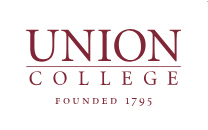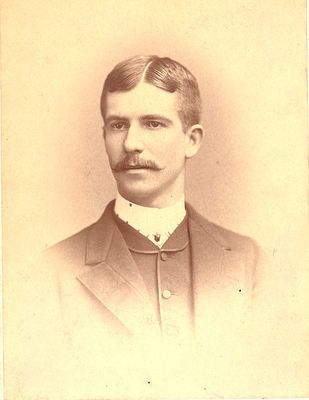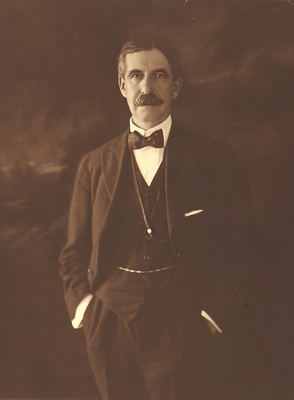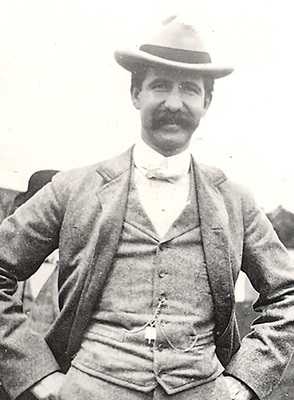Frank Bailey "Unparalleled contributions
(January 5, 1865 – August 26, 1953)
Union College Class of 1885 Treasurer 1901-1953 and Trustee 1910-1953
One of the most influential figures in Union College’s history, Frank Bailey was born in 1865 in Chatham, New York. His father was a poor country doctor who had graduated from Rensselaer Polytechnic Institute and his mother was a graduate of Mount Holyoke. Eager to escape poverty and follow in the steps of his parents, Bailey took his education seriously and was awarded a first grade scholarship to Union at the age of sixteen. Although he started out in liberal arts, he eventually switched to the scientific course, planning to be a doctor. He graduated in 1885, third in his class, a member of Phi Beta Kappa, and commencement orator. Later he would recall that his chief mentors at Union were Professors Maurice Perkins and Henry Whitehorne, both of whom challenged him to “think for himself.” After his graduation, Bailey went to New York City and worked his way up from a position of office boy to become president of the Title Guarantee and Trust Company in 1923. That and other business interests, as well as profits from development projects in Brooklyn, eventually made him a wealthy man. Bailey also held leading positions in many civic organizations including the Brooklyn Academy of Music, the Brooklyn Botanical Garden, and the Museum of the City of New York.
In 1901, having already served as the President of Union’s Alumni Association, Bailey was asked by President Raymond to become the College Treasurer. (A decade later he was also elected to the Board of Trustees.) It was a critical time in Union’s history; the College was in such bad financial shape that there was even talk of closing it down. Bailey established policies that brought the College from the brink of insolvency to fiscal health, enabling the College to live within its annual income, to invest new gifts, and to increase its financial resources by selling unused property to the west and east of the campus proper. Although Bailey remained in New York City himself, he also hired assistant treasurers, such as the infamous Charles Pond, to collect bills and keep an eye on local finances. In addition, Bailey made an unparalleled number of personal contributions to the College, funding buildings, academic programs, endowed chairs, scholarships, and student prizes as well as making numerous smaller gifts to balance the budget and donating his collection of books on American wit and humor to the College library. In his will, Bailey also left Union $1,500,000, some of which was used to construct the Frank Bailey athletic field. Overall, Bailey donated around three million dollars from his personal fortune to the College. Ever grateful for the opportunity Union gave him with a free education, he viewed his gifts and services as the repayment of a loan and sought no further recognition from the College. Nevertheless, Union awarded him an honorary Doctor of Arts degree in 1908 with a citation of “Savior of Union College,” an LLD in 1923, and the first Alumni Council Gold Medal in 1937.
Mrs. Perkins and Frank Bailey had a pleasant relationship, perhaps as a consequence of the happy relationship he had formed with her husband during his undergraduate years at the College.
Frank Bailey has accepted the Treasurer’s place, which is a perfect appointment and shows his real attachment for the College,
she wrote on October 11, 1901. She had great faith that he would quickly be able to improve the college’s finances, as of course he did. Bailey sent Mrs. Perkins carnations during the winter following her husband’s death, and she recorded his cordial responses when she wrote to him once or twice with complaints about College business.
Bailey’s family life was marked by a number of tragedies. His first two wives, Carrie E. Fingarr and Josephine Schott (the latter of whom Mrs. Perkins described as being
very gay and lively; tall and handsome and full of spirit [November 22, 1903]),
both died after less than ten years of marriage. In 1905 he married Marie Louise Lambert, a granddaughter of a former Brooklyn mayor, and that couple had two children. Frank Jr. was in the class of 1931 at Union but died his senior year of a blood malady. Their daughter Barbara graduated from Vassar College and married John Vanneck, who eventually joined Bailey on the Union Board of Trustees. Bailey himself died on August 26, 1953. Appropriately, the College’s great benefactor had spent his last day presiding over its financial committee.




